Personal & Knowledge Development Reflection Report: MGMT20140
VerifiedAdded on 2022/09/28
|12
|3783
|22
Report
AI Summary
This reflective report, based on the MGMT20140 Design Thinking for Managers module, details a student's journey of personal and knowledge development. The report integrates weekly blog entries, activities, skills, and assessments from a 12-week schedule to demonstrate learning and growth. The reflection is categorized into knowledge and personal development, highlighting the application of DT tools such as empathy, ideation, and rapid prototyping. The student discusses the evolution of their personality, the significance of design thinking, and the development of skills like brainstorming, journey mapping, and reflective writing. The report also includes an action plan for future development, emphasizing the practical application of design thinking principles in both personal and professional contexts. The student's experience includes participation in workshops, activities, and feedback sessions, which have contributed to enhanced skills in time management, self-awareness, and team work.
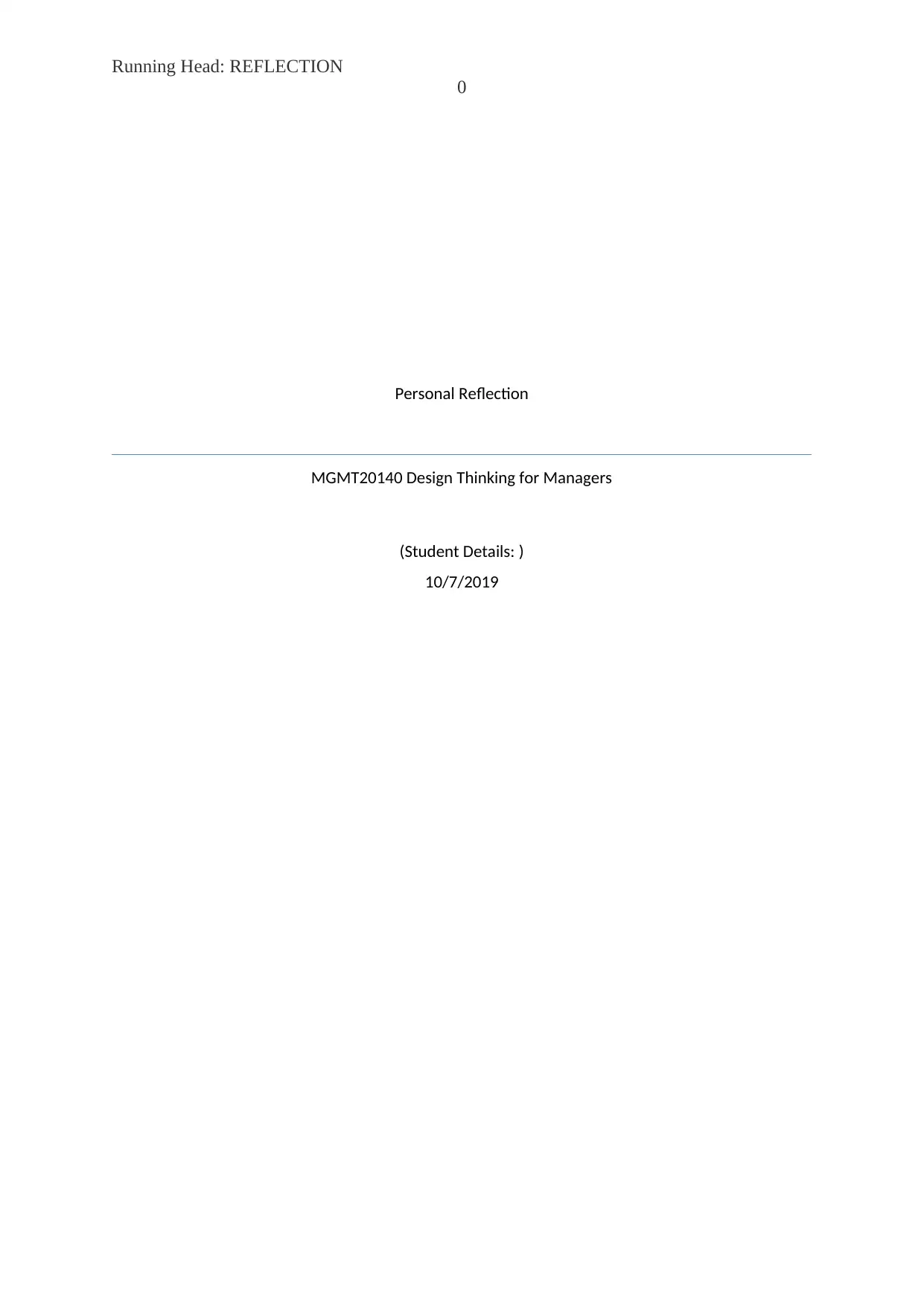
Running Head: REFLECTION
0
Personal Reflection
MGMT20140 Design Thinking for Managers
(Student Details: )
10/7/2019
0
Personal Reflection
MGMT20140 Design Thinking for Managers
(Student Details: )
10/7/2019
Paraphrase This Document
Need a fresh take? Get an instant paraphrase of this document with our AI Paraphraser
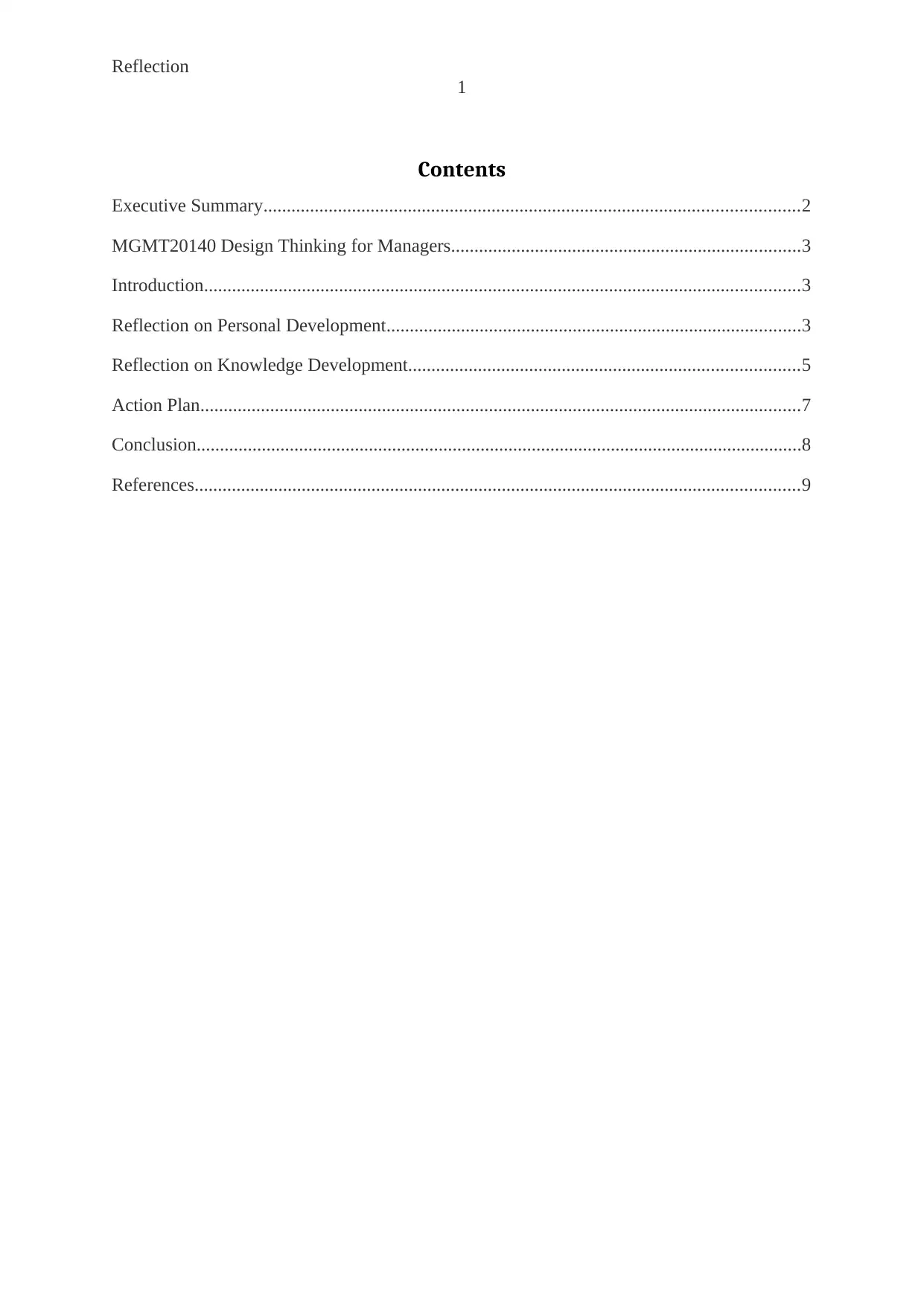
Reflection
1
Contents
Executive Summary...................................................................................................................2
MGMT20140 Design Thinking for Managers...........................................................................3
Introduction................................................................................................................................3
Reflection on Personal Development.........................................................................................3
Reflection on Knowledge Development....................................................................................5
Action Plan.................................................................................................................................7
Conclusion..................................................................................................................................8
References..................................................................................................................................9
1
Contents
Executive Summary...................................................................................................................2
MGMT20140 Design Thinking for Managers...........................................................................3
Introduction................................................................................................................................3
Reflection on Personal Development.........................................................................................3
Reflection on Knowledge Development....................................................................................5
Action Plan.................................................................................................................................7
Conclusion..................................................................................................................................8
References..................................................................................................................................9
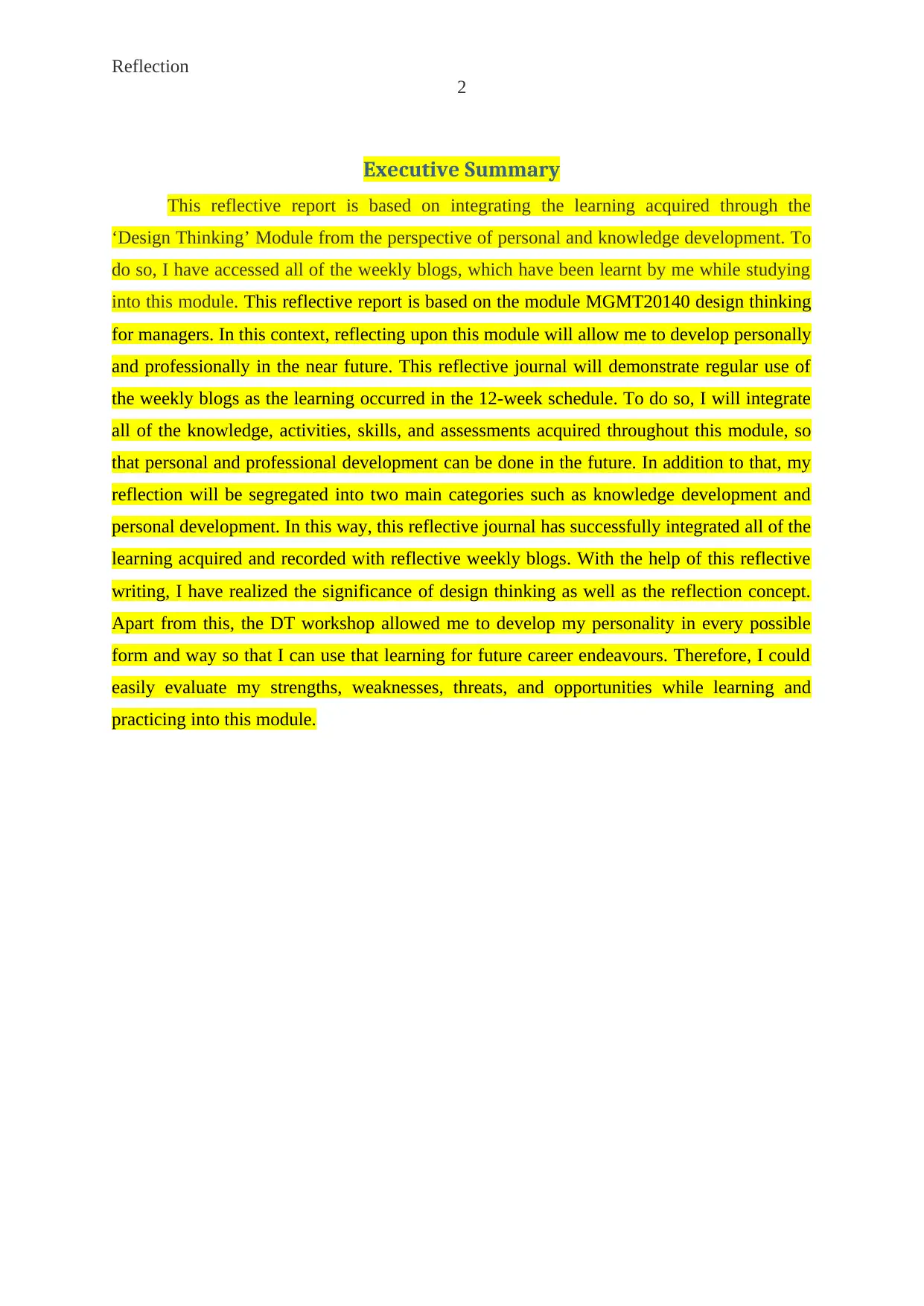
Reflection
2
Executive Summary
This reflective report is based on integrating the learning acquired through the
‘Design Thinking’ Module from the perspective of personal and knowledge development. To
do so, I have accessed all of the weekly blogs, which have been learnt by me while studying
into this module. This reflective report is based on the module MGMT20140 design thinking
for managers. In this context, reflecting upon this module will allow me to develop personally
and professionally in the near future. This reflective journal will demonstrate regular use of
the weekly blogs as the learning occurred in the 12-week schedule. To do so, I will integrate
all of the knowledge, activities, skills, and assessments acquired throughout this module, so
that personal and professional development can be done in the future. In addition to that, my
reflection will be segregated into two main categories such as knowledge development and
personal development. In this way, this reflective journal has successfully integrated all of the
learning acquired and recorded with reflective weekly blogs. With the help of this reflective
writing, I have realized the significance of design thinking as well as the reflection concept.
Apart from this, the DT workshop allowed me to develop my personality in every possible
form and way so that I can use that learning for future career endeavours. Therefore, I could
easily evaluate my strengths, weaknesses, threats, and opportunities while learning and
practicing into this module.
2
Executive Summary
This reflective report is based on integrating the learning acquired through the
‘Design Thinking’ Module from the perspective of personal and knowledge development. To
do so, I have accessed all of the weekly blogs, which have been learnt by me while studying
into this module. This reflective report is based on the module MGMT20140 design thinking
for managers. In this context, reflecting upon this module will allow me to develop personally
and professionally in the near future. This reflective journal will demonstrate regular use of
the weekly blogs as the learning occurred in the 12-week schedule. To do so, I will integrate
all of the knowledge, activities, skills, and assessments acquired throughout this module, so
that personal and professional development can be done in the future. In addition to that, my
reflection will be segregated into two main categories such as knowledge development and
personal development. In this way, this reflective journal has successfully integrated all of the
learning acquired and recorded with reflective weekly blogs. With the help of this reflective
writing, I have realized the significance of design thinking as well as the reflection concept.
Apart from this, the DT workshop allowed me to develop my personality in every possible
form and way so that I can use that learning for future career endeavours. Therefore, I could
easily evaluate my strengths, weaknesses, threats, and opportunities while learning and
practicing into this module.
⊘ This is a preview!⊘
Do you want full access?
Subscribe today to unlock all pages.

Trusted by 1+ million students worldwide
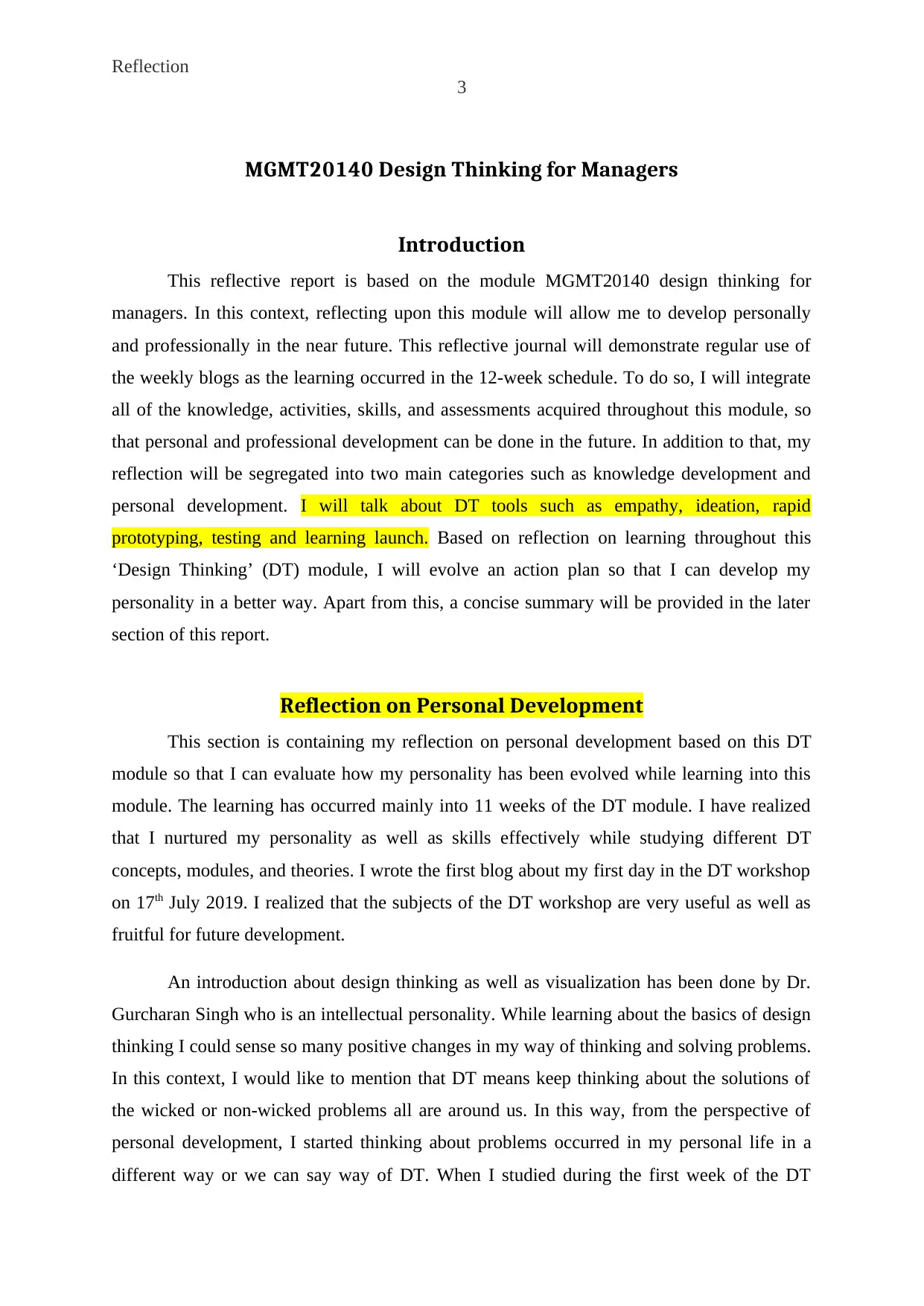
Reflection
3
MGMT20140 Design Thinking for Managers
Introduction
This reflective report is based on the module MGMT20140 design thinking for
managers. In this context, reflecting upon this module will allow me to develop personally
and professionally in the near future. This reflective journal will demonstrate regular use of
the weekly blogs as the learning occurred in the 12-week schedule. To do so, I will integrate
all of the knowledge, activities, skills, and assessments acquired throughout this module, so
that personal and professional development can be done in the future. In addition to that, my
reflection will be segregated into two main categories such as knowledge development and
personal development. I will talk about DT tools such as empathy, ideation, rapid
prototyping, testing and learning launch. Based on reflection on learning throughout this
‘Design Thinking’ (DT) module, I will evolve an action plan so that I can develop my
personality in a better way. Apart from this, a concise summary will be provided in the later
section of this report.
Reflection on Personal Development
This section is containing my reflection on personal development based on this DT
module so that I can evaluate how my personality has been evolved while learning into this
module. The learning has occurred mainly into 11 weeks of the DT module. I have realized
that I nurtured my personality as well as skills effectively while studying different DT
concepts, modules, and theories. I wrote the first blog about my first day in the DT workshop
on 17th July 2019. I realized that the subjects of the DT workshop are very useful as well as
fruitful for future development.
An introduction about design thinking as well as visualization has been done by Dr.
Gurcharan Singh who is an intellectual personality. While learning about the basics of design
thinking I could sense so many positive changes in my way of thinking and solving problems.
In this context, I would like to mention that DT means keep thinking about the solutions of
the wicked or non-wicked problems all are around us. In this way, from the perspective of
personal development, I started thinking about problems occurred in my personal life in a
different way or we can say way of DT. When I studied during the first week of the DT
3
MGMT20140 Design Thinking for Managers
Introduction
This reflective report is based on the module MGMT20140 design thinking for
managers. In this context, reflecting upon this module will allow me to develop personally
and professionally in the near future. This reflective journal will demonstrate regular use of
the weekly blogs as the learning occurred in the 12-week schedule. To do so, I will integrate
all of the knowledge, activities, skills, and assessments acquired throughout this module, so
that personal and professional development can be done in the future. In addition to that, my
reflection will be segregated into two main categories such as knowledge development and
personal development. I will talk about DT tools such as empathy, ideation, rapid
prototyping, testing and learning launch. Based on reflection on learning throughout this
‘Design Thinking’ (DT) module, I will evolve an action plan so that I can develop my
personality in a better way. Apart from this, a concise summary will be provided in the later
section of this report.
Reflection on Personal Development
This section is containing my reflection on personal development based on this DT
module so that I can evaluate how my personality has been evolved while learning into this
module. The learning has occurred mainly into 11 weeks of the DT module. I have realized
that I nurtured my personality as well as skills effectively while studying different DT
concepts, modules, and theories. I wrote the first blog about my first day in the DT workshop
on 17th July 2019. I realized that the subjects of the DT workshop are very useful as well as
fruitful for future development.
An introduction about design thinking as well as visualization has been done by Dr.
Gurcharan Singh who is an intellectual personality. While learning about the basics of design
thinking I could sense so many positive changes in my way of thinking and solving problems.
In this context, I would like to mention that DT means keep thinking about the solutions of
the wicked or non-wicked problems all are around us. In this way, from the perspective of
personal development, I started thinking about problems occurred in my personal life in a
different way or we can say way of DT. When I studied during the first week of the DT
Paraphrase This Document
Need a fresh take? Get an instant paraphrase of this document with our AI Paraphraser
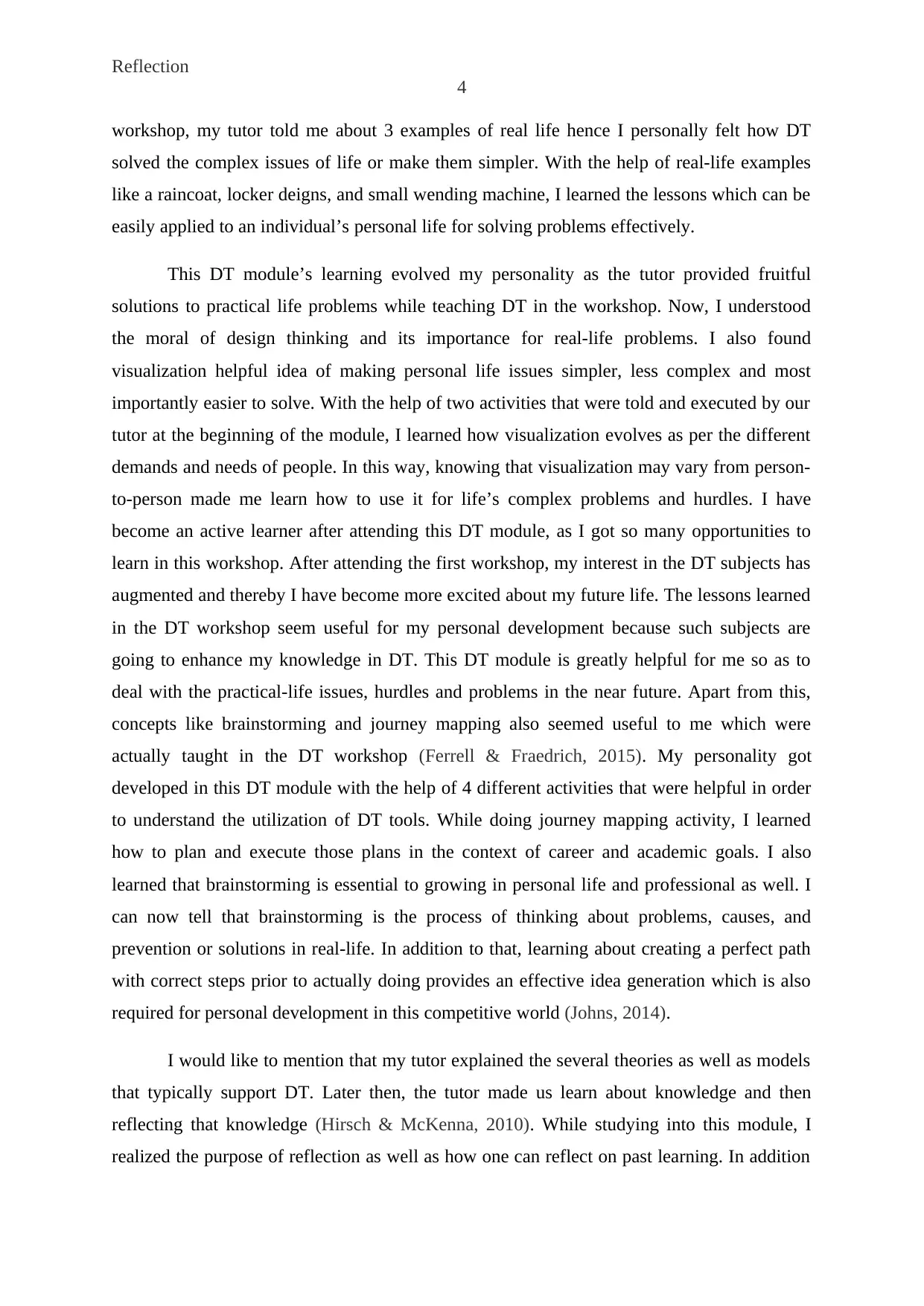
Reflection
4
workshop, my tutor told me about 3 examples of real life hence I personally felt how DT
solved the complex issues of life or make them simpler. With the help of real-life examples
like a raincoat, locker deigns, and small wending machine, I learned the lessons which can be
easily applied to an individual’s personal life for solving problems effectively.
This DT module’s learning evolved my personality as the tutor provided fruitful
solutions to practical life problems while teaching DT in the workshop. Now, I understood
the moral of design thinking and its importance for real-life problems. I also found
visualization helpful idea of making personal life issues simpler, less complex and most
importantly easier to solve. With the help of two activities that were told and executed by our
tutor at the beginning of the module, I learned how visualization evolves as per the different
demands and needs of people. In this way, knowing that visualization may vary from person-
to-person made me learn how to use it for life’s complex problems and hurdles. I have
become an active learner after attending this DT module, as I got so many opportunities to
learn in this workshop. After attending the first workshop, my interest in the DT subjects has
augmented and thereby I have become more excited about my future life. The lessons learned
in the DT workshop seem useful for my personal development because such subjects are
going to enhance my knowledge in DT. This DT module is greatly helpful for me so as to
deal with the practical-life issues, hurdles and problems in the near future. Apart from this,
concepts like brainstorming and journey mapping also seemed useful to me which were
actually taught in the DT workshop (Ferrell & Fraedrich, 2015). My personality got
developed in this DT module with the help of 4 different activities that were helpful in order
to understand the utilization of DT tools. While doing journey mapping activity, I learned
how to plan and execute those plans in the context of career and academic goals. I also
learned that brainstorming is essential to growing in personal life and professional as well. I
can now tell that brainstorming is the process of thinking about problems, causes, and
prevention or solutions in real-life. In addition to that, learning about creating a perfect path
with correct steps prior to actually doing provides an effective idea generation which is also
required for personal development in this competitive world (Johns, 2014).
I would like to mention that my tutor explained the several theories as well as models
that typically support DT. Later then, the tutor made us learn about knowledge and then
reflecting that knowledge (Hirsch & McKenna, 2010). While studying into this module, I
realized the purpose of reflection as well as how one can reflect on past learning. In addition
4
workshop, my tutor told me about 3 examples of real life hence I personally felt how DT
solved the complex issues of life or make them simpler. With the help of real-life examples
like a raincoat, locker deigns, and small wending machine, I learned the lessons which can be
easily applied to an individual’s personal life for solving problems effectively.
This DT module’s learning evolved my personality as the tutor provided fruitful
solutions to practical life problems while teaching DT in the workshop. Now, I understood
the moral of design thinking and its importance for real-life problems. I also found
visualization helpful idea of making personal life issues simpler, less complex and most
importantly easier to solve. With the help of two activities that were told and executed by our
tutor at the beginning of the module, I learned how visualization evolves as per the different
demands and needs of people. In this way, knowing that visualization may vary from person-
to-person made me learn how to use it for life’s complex problems and hurdles. I have
become an active learner after attending this DT module, as I got so many opportunities to
learn in this workshop. After attending the first workshop, my interest in the DT subjects has
augmented and thereby I have become more excited about my future life. The lessons learned
in the DT workshop seem useful for my personal development because such subjects are
going to enhance my knowledge in DT. This DT module is greatly helpful for me so as to
deal with the practical-life issues, hurdles and problems in the near future. Apart from this,
concepts like brainstorming and journey mapping also seemed useful to me which were
actually taught in the DT workshop (Ferrell & Fraedrich, 2015). My personality got
developed in this DT module with the help of 4 different activities that were helpful in order
to understand the utilization of DT tools. While doing journey mapping activity, I learned
how to plan and execute those plans in the context of career and academic goals. I also
learned that brainstorming is essential to growing in personal life and professional as well. I
can now tell that brainstorming is the process of thinking about problems, causes, and
prevention or solutions in real-life. In addition to that, learning about creating a perfect path
with correct steps prior to actually doing provides an effective idea generation which is also
required for personal development in this competitive world (Johns, 2014).
I would like to mention that my tutor explained the several theories as well as models
that typically support DT. Later then, the tutor made us learn about knowledge and then
reflecting that knowledge (Hirsch & McKenna, 2010). While studying into this module, I
realized the purpose of reflection as well as how one can reflect on past learning. In addition
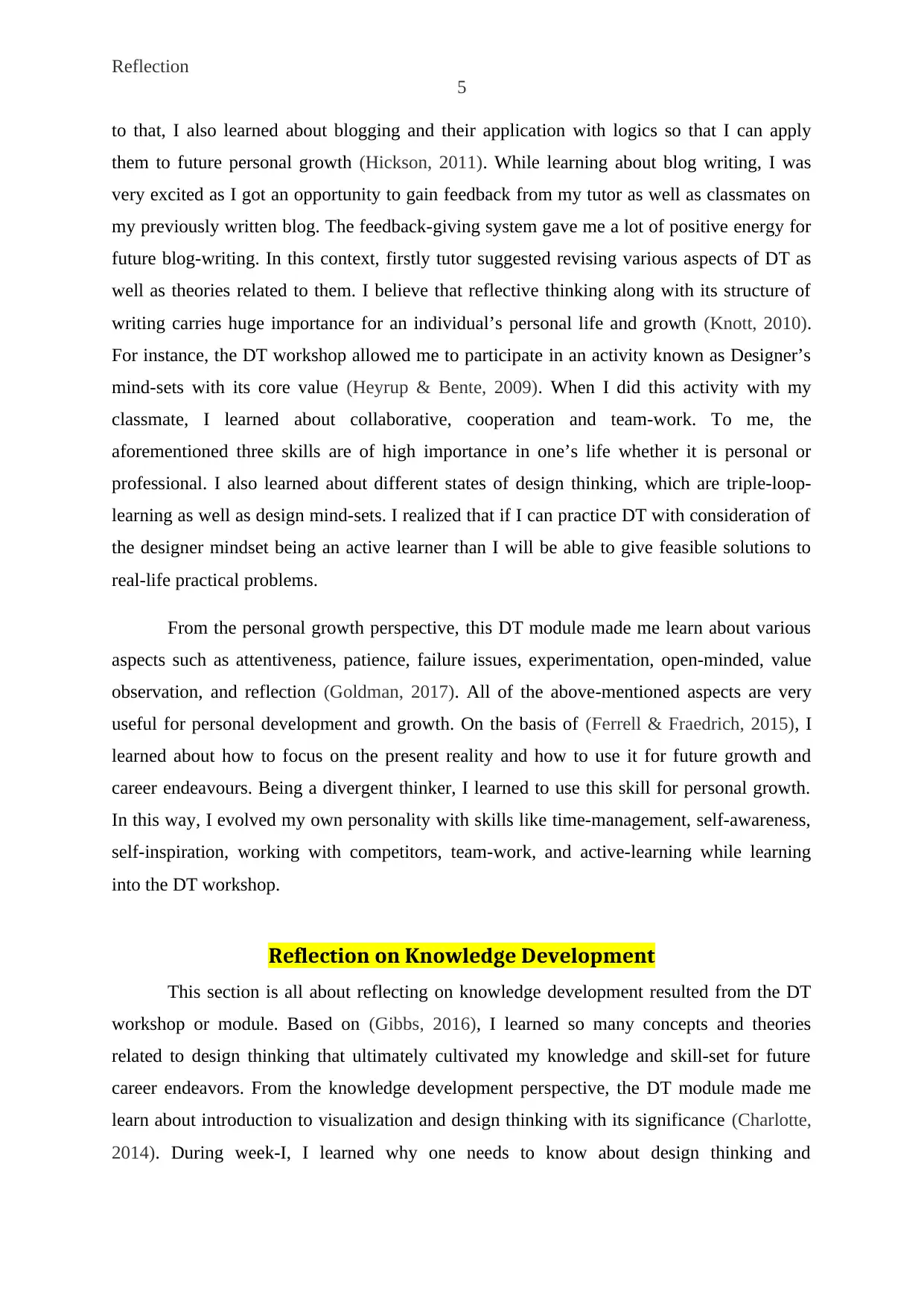
Reflection
5
to that, I also learned about blogging and their application with logics so that I can apply
them to future personal growth (Hickson, 2011). While learning about blog writing, I was
very excited as I got an opportunity to gain feedback from my tutor as well as classmates on
my previously written blog. The feedback-giving system gave me a lot of positive energy for
future blog-writing. In this context, firstly tutor suggested revising various aspects of DT as
well as theories related to them. I believe that reflective thinking along with its structure of
writing carries huge importance for an individual’s personal life and growth (Knott, 2010).
For instance, the DT workshop allowed me to participate in an activity known as Designer’s
mind-sets with its core value (Heyrup & Bente, 2009). When I did this activity with my
classmate, I learned about collaborative, cooperation and team-work. To me, the
aforementioned three skills are of high importance in one’s life whether it is personal or
professional. I also learned about different states of design thinking, which are triple-loop-
learning as well as design mind-sets. I realized that if I can practice DT with consideration of
the designer mindset being an active learner than I will be able to give feasible solutions to
real-life practical problems.
From the personal growth perspective, this DT module made me learn about various
aspects such as attentiveness, patience, failure issues, experimentation, open-minded, value
observation, and reflection (Goldman, 2017). All of the above-mentioned aspects are very
useful for personal development and growth. On the basis of (Ferrell & Fraedrich, 2015), I
learned about how to focus on the present reality and how to use it for future growth and
career endeavours. Being a divergent thinker, I learned to use this skill for personal growth.
In this way, I evolved my own personality with skills like time-management, self-awareness,
self-inspiration, working with competitors, team-work, and active-learning while learning
into the DT workshop.
Reflection on Knowledge Development
This section is all about reflecting on knowledge development resulted from the DT
workshop or module. Based on (Gibbs, 2016), I learned so many concepts and theories
related to design thinking that ultimately cultivated my knowledge and skill-set for future
career endeavors. From the knowledge development perspective, the DT module made me
learn about introduction to visualization and design thinking with its significance (Charlotte,
2014). During week-I, I learned why one needs to know about design thinking and
5
to that, I also learned about blogging and their application with logics so that I can apply
them to future personal growth (Hickson, 2011). While learning about blog writing, I was
very excited as I got an opportunity to gain feedback from my tutor as well as classmates on
my previously written blog. The feedback-giving system gave me a lot of positive energy for
future blog-writing. In this context, firstly tutor suggested revising various aspects of DT as
well as theories related to them. I believe that reflective thinking along with its structure of
writing carries huge importance for an individual’s personal life and growth (Knott, 2010).
For instance, the DT workshop allowed me to participate in an activity known as Designer’s
mind-sets with its core value (Heyrup & Bente, 2009). When I did this activity with my
classmate, I learned about collaborative, cooperation and team-work. To me, the
aforementioned three skills are of high importance in one’s life whether it is personal or
professional. I also learned about different states of design thinking, which are triple-loop-
learning as well as design mind-sets. I realized that if I can practice DT with consideration of
the designer mindset being an active learner than I will be able to give feasible solutions to
real-life practical problems.
From the personal growth perspective, this DT module made me learn about various
aspects such as attentiveness, patience, failure issues, experimentation, open-minded, value
observation, and reflection (Goldman, 2017). All of the above-mentioned aspects are very
useful for personal development and growth. On the basis of (Ferrell & Fraedrich, 2015), I
learned about how to focus on the present reality and how to use it for future growth and
career endeavours. Being a divergent thinker, I learned to use this skill for personal growth.
In this way, I evolved my own personality with skills like time-management, self-awareness,
self-inspiration, working with competitors, team-work, and active-learning while learning
into the DT workshop.
Reflection on Knowledge Development
This section is all about reflecting on knowledge development resulted from the DT
workshop or module. Based on (Gibbs, 2016), I learned so many concepts and theories
related to design thinking that ultimately cultivated my knowledge and skill-set for future
career endeavors. From the knowledge development perspective, the DT module made me
learn about introduction to visualization and design thinking with its significance (Charlotte,
2014). During week-I, I learned why one needs to know about design thinking and
⊘ This is a preview!⊘
Do you want full access?
Subscribe today to unlock all pages.

Trusted by 1+ million students worldwide
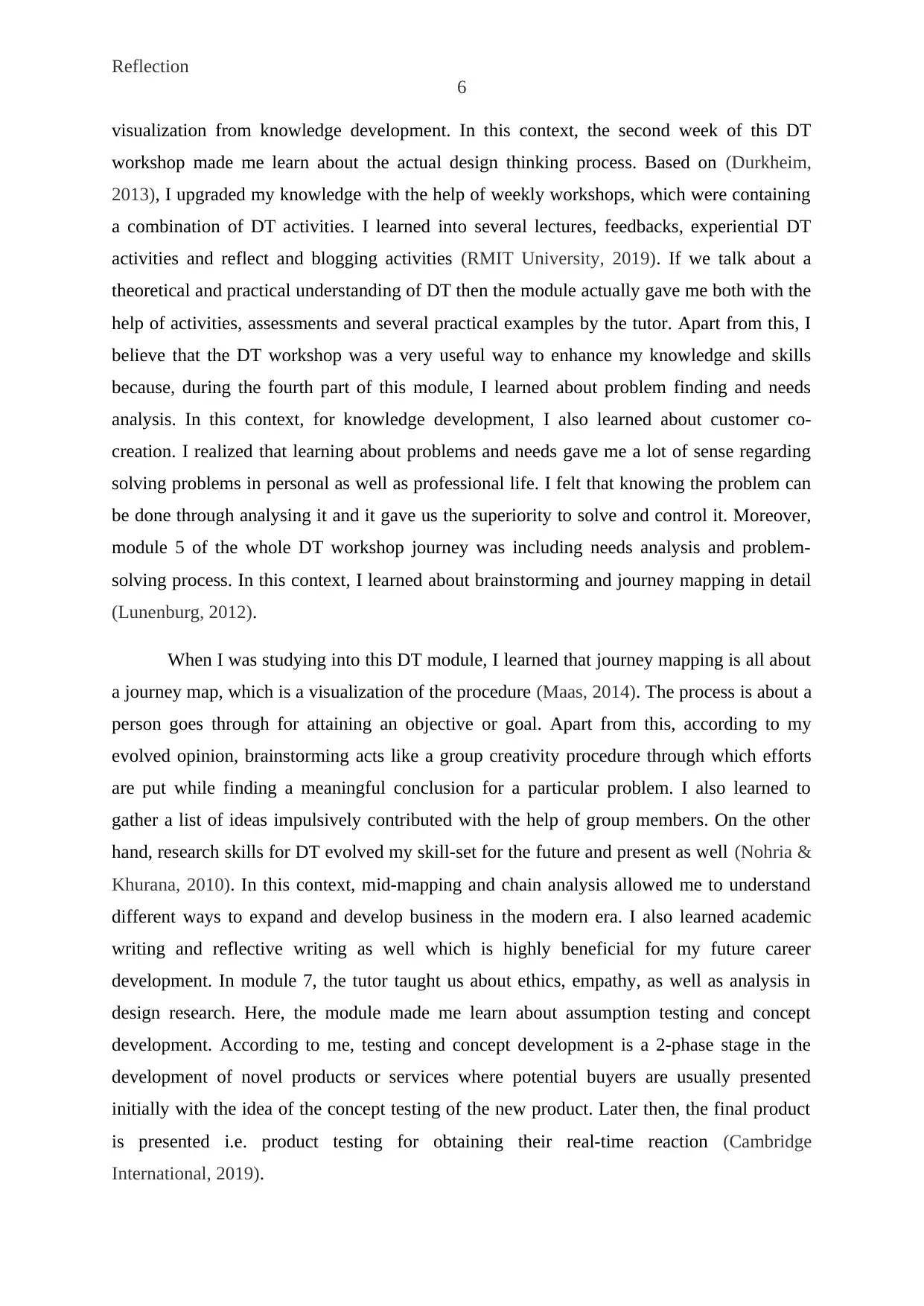
Reflection
6
visualization from knowledge development. In this context, the second week of this DT
workshop made me learn about the actual design thinking process. Based on (Durkheim,
2013), I upgraded my knowledge with the help of weekly workshops, which were containing
a combination of DT activities. I learned into several lectures, feedbacks, experiential DT
activities and reflect and blogging activities (RMIT University, 2019). If we talk about a
theoretical and practical understanding of DT then the module actually gave me both with the
help of activities, assessments and several practical examples by the tutor. Apart from this, I
believe that the DT workshop was a very useful way to enhance my knowledge and skills
because, during the fourth part of this module, I learned about problem finding and needs
analysis. In this context, for knowledge development, I also learned about customer co-
creation. I realized that learning about problems and needs gave me a lot of sense regarding
solving problems in personal as well as professional life. I felt that knowing the problem can
be done through analysing it and it gave us the superiority to solve and control it. Moreover,
module 5 of the whole DT workshop journey was including needs analysis and problem-
solving process. In this context, I learned about brainstorming and journey mapping in detail
(Lunenburg, 2012).
When I was studying into this DT module, I learned that journey mapping is all about
a journey map, which is a visualization of the procedure (Maas, 2014). The process is about a
person goes through for attaining an objective or goal. Apart from this, according to my
evolved opinion, brainstorming acts like a group creativity procedure through which efforts
are put while finding a meaningful conclusion for a particular problem. I also learned to
gather a list of ideas impulsively contributed with the help of group members. On the other
hand, research skills for DT evolved my skill-set for the future and present as well (Nohria &
Khurana, 2010). In this context, mid-mapping and chain analysis allowed me to understand
different ways to expand and develop business in the modern era. I also learned academic
writing and reflective writing as well which is highly beneficial for my future career
development. In module 7, the tutor taught us about ethics, empathy, as well as analysis in
design research. Here, the module made me learn about assumption testing and concept
development. According to me, testing and concept development is a 2-phase stage in the
development of novel products or services where potential buyers are usually presented
initially with the idea of the concept testing of the new product. Later then, the final product
is presented i.e. product testing for obtaining their real-time reaction (Cambridge
International, 2019).
6
visualization from knowledge development. In this context, the second week of this DT
workshop made me learn about the actual design thinking process. Based on (Durkheim,
2013), I upgraded my knowledge with the help of weekly workshops, which were containing
a combination of DT activities. I learned into several lectures, feedbacks, experiential DT
activities and reflect and blogging activities (RMIT University, 2019). If we talk about a
theoretical and practical understanding of DT then the module actually gave me both with the
help of activities, assessments and several practical examples by the tutor. Apart from this, I
believe that the DT workshop was a very useful way to enhance my knowledge and skills
because, during the fourth part of this module, I learned about problem finding and needs
analysis. In this context, for knowledge development, I also learned about customer co-
creation. I realized that learning about problems and needs gave me a lot of sense regarding
solving problems in personal as well as professional life. I felt that knowing the problem can
be done through analysing it and it gave us the superiority to solve and control it. Moreover,
module 5 of the whole DT workshop journey was including needs analysis and problem-
solving process. In this context, I learned about brainstorming and journey mapping in detail
(Lunenburg, 2012).
When I was studying into this DT module, I learned that journey mapping is all about
a journey map, which is a visualization of the procedure (Maas, 2014). The process is about a
person goes through for attaining an objective or goal. Apart from this, according to my
evolved opinion, brainstorming acts like a group creativity procedure through which efforts
are put while finding a meaningful conclusion for a particular problem. I also learned to
gather a list of ideas impulsively contributed with the help of group members. On the other
hand, research skills for DT evolved my skill-set for the future and present as well (Nohria &
Khurana, 2010). In this context, mid-mapping and chain analysis allowed me to understand
different ways to expand and develop business in the modern era. I also learned academic
writing and reflective writing as well which is highly beneficial for my future career
development. In module 7, the tutor taught us about ethics, empathy, as well as analysis in
design research. Here, the module made me learn about assumption testing and concept
development. According to me, testing and concept development is a 2-phase stage in the
development of novel products or services where potential buyers are usually presented
initially with the idea of the concept testing of the new product. Later then, the final product
is presented i.e. product testing for obtaining their real-time reaction (Cambridge
International, 2019).
Paraphrase This Document
Need a fresh take? Get an instant paraphrase of this document with our AI Paraphraser
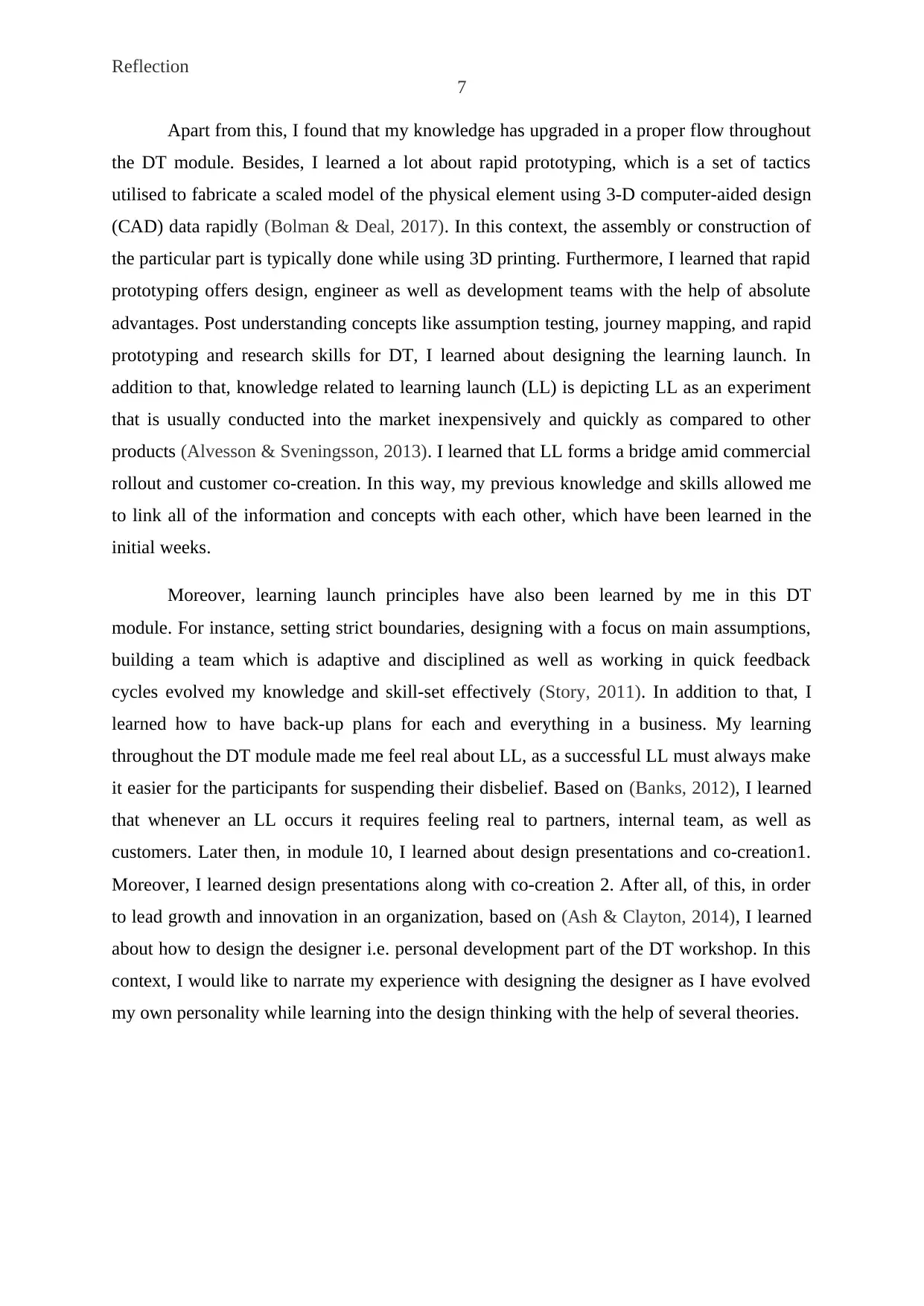
Reflection
7
Apart from this, I found that my knowledge has upgraded in a proper flow throughout
the DT module. Besides, I learned a lot about rapid prototyping, which is a set of tactics
utilised to fabricate a scaled model of the physical element using 3-D computer-aided design
(CAD) data rapidly (Bolman & Deal, 2017). In this context, the assembly or construction of
the particular part is typically done while using 3D printing. Furthermore, I learned that rapid
prototyping offers design, engineer as well as development teams with the help of absolute
advantages. Post understanding concepts like assumption testing, journey mapping, and rapid
prototyping and research skills for DT, I learned about designing the learning launch. In
addition to that, knowledge related to learning launch (LL) is depicting LL as an experiment
that is usually conducted into the market inexpensively and quickly as compared to other
products (Alvesson & Sveningsson, 2013). I learned that LL forms a bridge amid commercial
rollout and customer co-creation. In this way, my previous knowledge and skills allowed me
to link all of the information and concepts with each other, which have been learned in the
initial weeks.
Moreover, learning launch principles have also been learned by me in this DT
module. For instance, setting strict boundaries, designing with a focus on main assumptions,
building a team which is adaptive and disciplined as well as working in quick feedback
cycles evolved my knowledge and skill-set effectively (Story, 2011). In addition to that, I
learned how to have back-up plans for each and everything in a business. My learning
throughout the DT module made me feel real about LL, as a successful LL must always make
it easier for the participants for suspending their disbelief. Based on (Banks, 2012), I learned
that whenever an LL occurs it requires feeling real to partners, internal team, as well as
customers. Later then, in module 10, I learned about design presentations and co-creation1.
Moreover, I learned design presentations along with co-creation 2. After all, of this, in order
to lead growth and innovation in an organization, based on (Ash & Clayton, 2014), I learned
about how to design the designer i.e. personal development part of the DT workshop. In this
context, I would like to narrate my experience with designing the designer as I have evolved
my own personality while learning into the design thinking with the help of several theories.
7
Apart from this, I found that my knowledge has upgraded in a proper flow throughout
the DT module. Besides, I learned a lot about rapid prototyping, which is a set of tactics
utilised to fabricate a scaled model of the physical element using 3-D computer-aided design
(CAD) data rapidly (Bolman & Deal, 2017). In this context, the assembly or construction of
the particular part is typically done while using 3D printing. Furthermore, I learned that rapid
prototyping offers design, engineer as well as development teams with the help of absolute
advantages. Post understanding concepts like assumption testing, journey mapping, and rapid
prototyping and research skills for DT, I learned about designing the learning launch. In
addition to that, knowledge related to learning launch (LL) is depicting LL as an experiment
that is usually conducted into the market inexpensively and quickly as compared to other
products (Alvesson & Sveningsson, 2013). I learned that LL forms a bridge amid commercial
rollout and customer co-creation. In this way, my previous knowledge and skills allowed me
to link all of the information and concepts with each other, which have been learned in the
initial weeks.
Moreover, learning launch principles have also been learned by me in this DT
module. For instance, setting strict boundaries, designing with a focus on main assumptions,
building a team which is adaptive and disciplined as well as working in quick feedback
cycles evolved my knowledge and skill-set effectively (Story, 2011). In addition to that, I
learned how to have back-up plans for each and everything in a business. My learning
throughout the DT module made me feel real about LL, as a successful LL must always make
it easier for the participants for suspending their disbelief. Based on (Banks, 2012), I learned
that whenever an LL occurs it requires feeling real to partners, internal team, as well as
customers. Later then, in module 10, I learned about design presentations and co-creation1.
Moreover, I learned design presentations along with co-creation 2. After all, of this, in order
to lead growth and innovation in an organization, based on (Ash & Clayton, 2014), I learned
about how to design the designer i.e. personal development part of the DT workshop. In this
context, I would like to narrate my experience with designing the designer as I have evolved
my own personality while learning into the design thinking with the help of several theories.
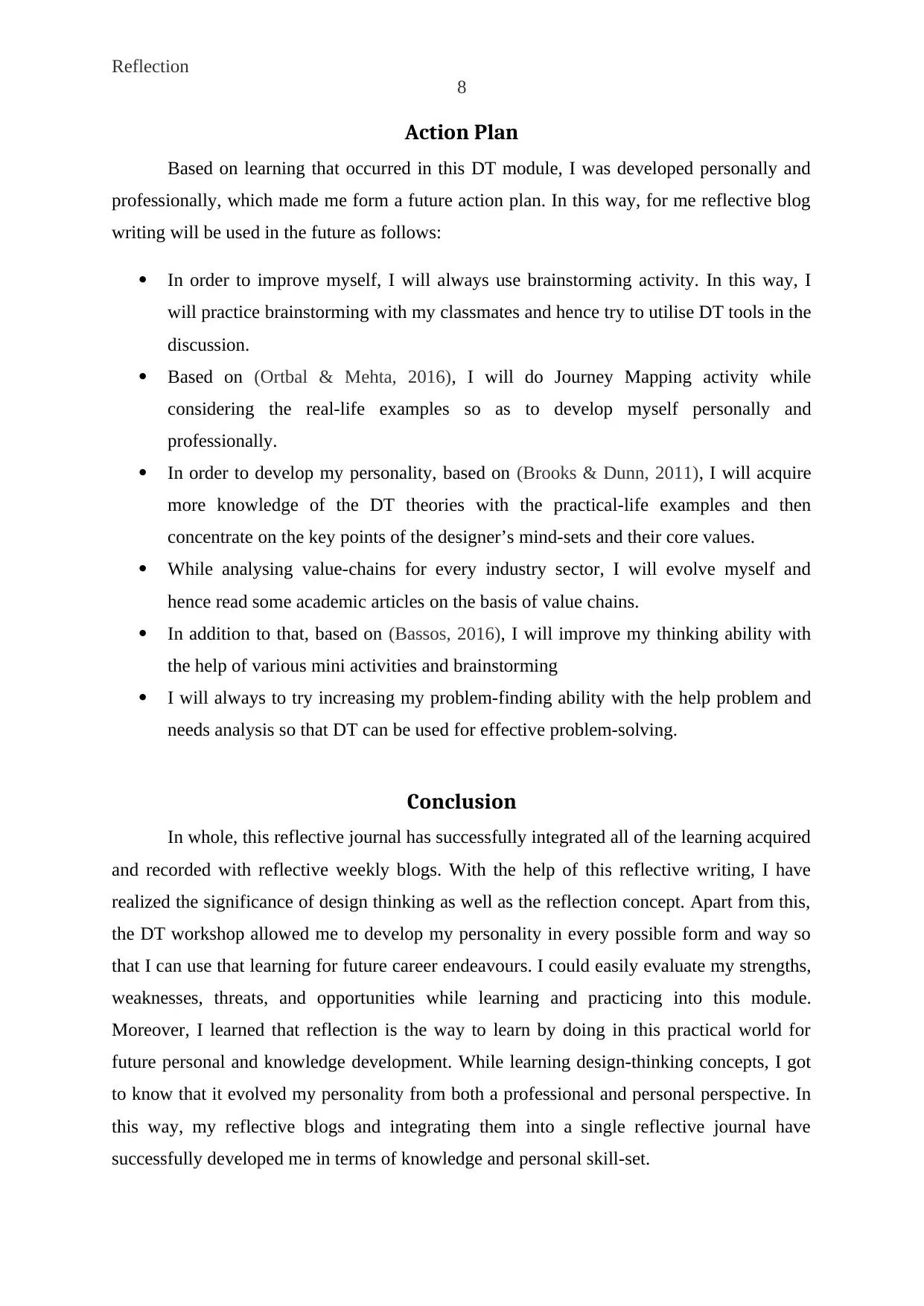
Reflection
8
Action Plan
Based on learning that occurred in this DT module, I was developed personally and
professionally, which made me form a future action plan. In this way, for me reflective blog
writing will be used in the future as follows:
In order to improve myself, I will always use brainstorming activity. In this way, I
will practice brainstorming with my classmates and hence try to utilise DT tools in the
discussion.
Based on (Ortbal & Mehta, 2016), I will do Journey Mapping activity while
considering the real-life examples so as to develop myself personally and
professionally.
In order to develop my personality, based on (Brooks & Dunn, 2011), I will acquire
more knowledge of the DT theories with the practical-life examples and then
concentrate on the key points of the designer’s mind-sets and their core values.
While analysing value-chains for every industry sector, I will evolve myself and
hence read some academic articles on the basis of value chains.
In addition to that, based on (Bassos, 2016), I will improve my thinking ability with
the help of various mini activities and brainstorming
I will always to try increasing my problem-finding ability with the help problem and
needs analysis so that DT can be used for effective problem-solving.
Conclusion
In whole, this reflective journal has successfully integrated all of the learning acquired
and recorded with reflective weekly blogs. With the help of this reflective writing, I have
realized the significance of design thinking as well as the reflection concept. Apart from this,
the DT workshop allowed me to develop my personality in every possible form and way so
that I can use that learning for future career endeavours. I could easily evaluate my strengths,
weaknesses, threats, and opportunities while learning and practicing into this module.
Moreover, I learned that reflection is the way to learn by doing in this practical world for
future personal and knowledge development. While learning design-thinking concepts, I got
to know that it evolved my personality from both a professional and personal perspective. In
this way, my reflective blogs and integrating them into a single reflective journal have
successfully developed me in terms of knowledge and personal skill-set.
8
Action Plan
Based on learning that occurred in this DT module, I was developed personally and
professionally, which made me form a future action plan. In this way, for me reflective blog
writing will be used in the future as follows:
In order to improve myself, I will always use brainstorming activity. In this way, I
will practice brainstorming with my classmates and hence try to utilise DT tools in the
discussion.
Based on (Ortbal & Mehta, 2016), I will do Journey Mapping activity while
considering the real-life examples so as to develop myself personally and
professionally.
In order to develop my personality, based on (Brooks & Dunn, 2011), I will acquire
more knowledge of the DT theories with the practical-life examples and then
concentrate on the key points of the designer’s mind-sets and their core values.
While analysing value-chains for every industry sector, I will evolve myself and
hence read some academic articles on the basis of value chains.
In addition to that, based on (Bassos, 2016), I will improve my thinking ability with
the help of various mini activities and brainstorming
I will always to try increasing my problem-finding ability with the help problem and
needs analysis so that DT can be used for effective problem-solving.
Conclusion
In whole, this reflective journal has successfully integrated all of the learning acquired
and recorded with reflective weekly blogs. With the help of this reflective writing, I have
realized the significance of design thinking as well as the reflection concept. Apart from this,
the DT workshop allowed me to develop my personality in every possible form and way so
that I can use that learning for future career endeavours. I could easily evaluate my strengths,
weaknesses, threats, and opportunities while learning and practicing into this module.
Moreover, I learned that reflection is the way to learn by doing in this practical world for
future personal and knowledge development. While learning design-thinking concepts, I got
to know that it evolved my personality from both a professional and personal perspective. In
this way, my reflective blogs and integrating them into a single reflective journal have
successfully developed me in terms of knowledge and personal skill-set.
⊘ This is a preview!⊘
Do you want full access?
Subscribe today to unlock all pages.

Trusted by 1+ million students worldwide

Reflection
9
9
Paraphrase This Document
Need a fresh take? Get an instant paraphrase of this document with our AI Paraphraser
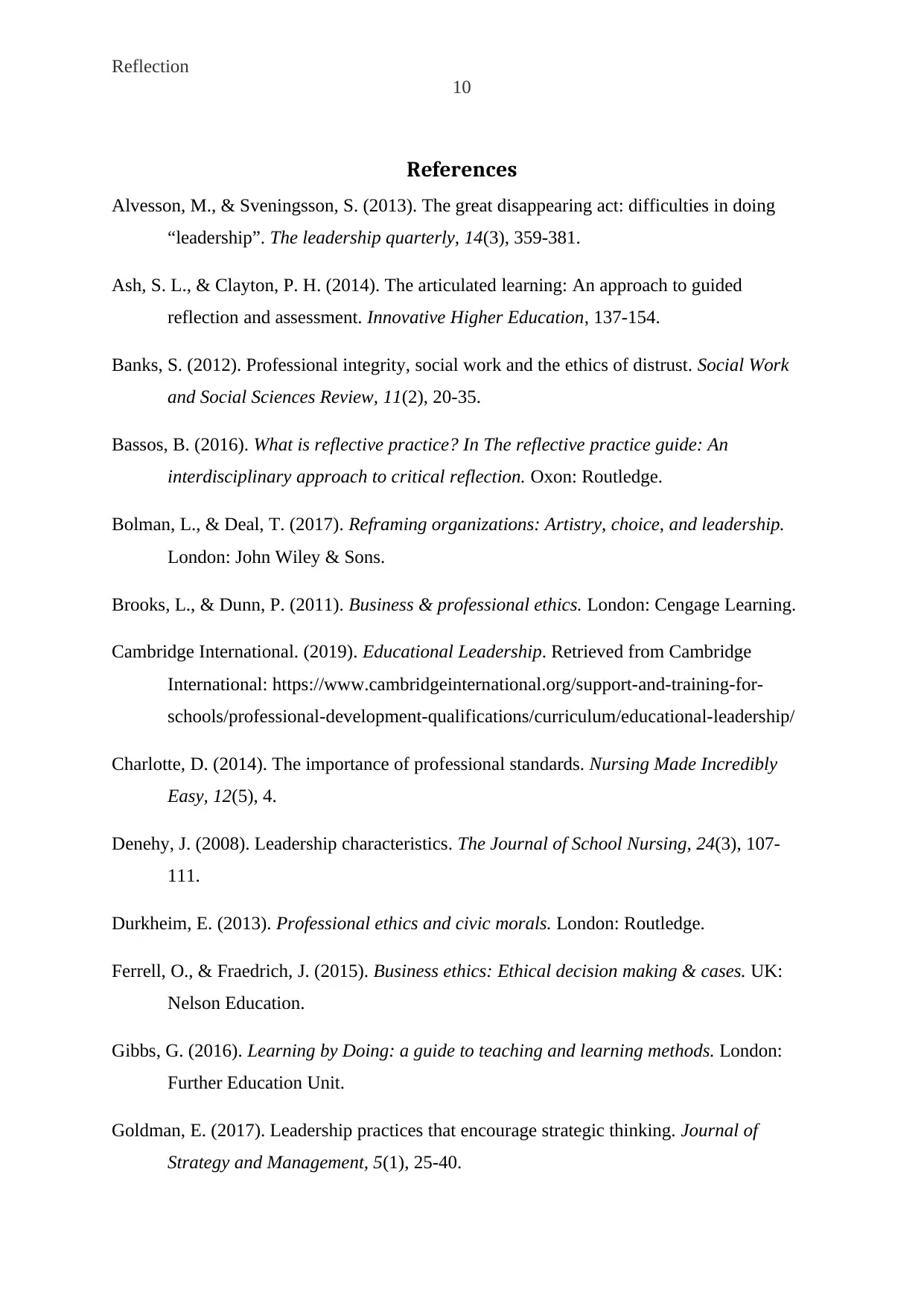
Reflection
10
References
Alvesson, M., & Sveningsson, S. (2013). The great disappearing act: difficulties in doing
“leadership”. The leadership quarterly, 14(3), 359-381.
Ash, S. L., & Clayton, P. H. (2014). The articulated learning: An approach to guided
reflection and assessment. Innovative Higher Education, 137-154.
Banks, S. (2012). Professional integrity, social work and the ethics of distrust. Social Work
and Social Sciences Review, 11(2), 20-35.
Bassos, B. (2016). What is reflective practice? In The reflective practice guide: An
interdisciplinary approach to critical reflection. Oxon: Routledge.
Bolman, L., & Deal, T. (2017). Reframing organizations: Artistry, choice, and leadership.
London: John Wiley & Sons.
Brooks, L., & Dunn, P. (2011). Business & professional ethics. London: Cengage Learning.
Cambridge International. (2019). Educational Leadership. Retrieved from Cambridge
International: https://www.cambridgeinternational.org/support-and-training-for-
schools/professional-development-qualifications/curriculum/educational-leadership/
Charlotte, D. (2014). The importance of professional standards. Nursing Made Incredibly
Easy, 12(5), 4.
Denehy, J. (2008). Leadership characteristics. The Journal of School Nursing, 24(3), 107-
111.
Durkheim, E. (2013). Professional ethics and civic morals. London: Routledge.
Ferrell, O., & Fraedrich, J. (2015). Business ethics: Ethical decision making & cases. UK:
Nelson Education.
Gibbs, G. (2016). Learning by Doing: a guide to teaching and learning methods. London:
Further Education Unit.
Goldman, E. (2017). Leadership practices that encourage strategic thinking. Journal of
Strategy and Management, 5(1), 25-40.
10
References
Alvesson, M., & Sveningsson, S. (2013). The great disappearing act: difficulties in doing
“leadership”. The leadership quarterly, 14(3), 359-381.
Ash, S. L., & Clayton, P. H. (2014). The articulated learning: An approach to guided
reflection and assessment. Innovative Higher Education, 137-154.
Banks, S. (2012). Professional integrity, social work and the ethics of distrust. Social Work
and Social Sciences Review, 11(2), 20-35.
Bassos, B. (2016). What is reflective practice? In The reflective practice guide: An
interdisciplinary approach to critical reflection. Oxon: Routledge.
Bolman, L., & Deal, T. (2017). Reframing organizations: Artistry, choice, and leadership.
London: John Wiley & Sons.
Brooks, L., & Dunn, P. (2011). Business & professional ethics. London: Cengage Learning.
Cambridge International. (2019). Educational Leadership. Retrieved from Cambridge
International: https://www.cambridgeinternational.org/support-and-training-for-
schools/professional-development-qualifications/curriculum/educational-leadership/
Charlotte, D. (2014). The importance of professional standards. Nursing Made Incredibly
Easy, 12(5), 4.
Denehy, J. (2008). Leadership characteristics. The Journal of School Nursing, 24(3), 107-
111.
Durkheim, E. (2013). Professional ethics and civic morals. London: Routledge.
Ferrell, O., & Fraedrich, J. (2015). Business ethics: Ethical decision making & cases. UK:
Nelson Education.
Gibbs, G. (2016). Learning by Doing: a guide to teaching and learning methods. London:
Further Education Unit.
Goldman, E. (2017). Leadership practices that encourage strategic thinking. Journal of
Strategy and Management, 5(1), 25-40.
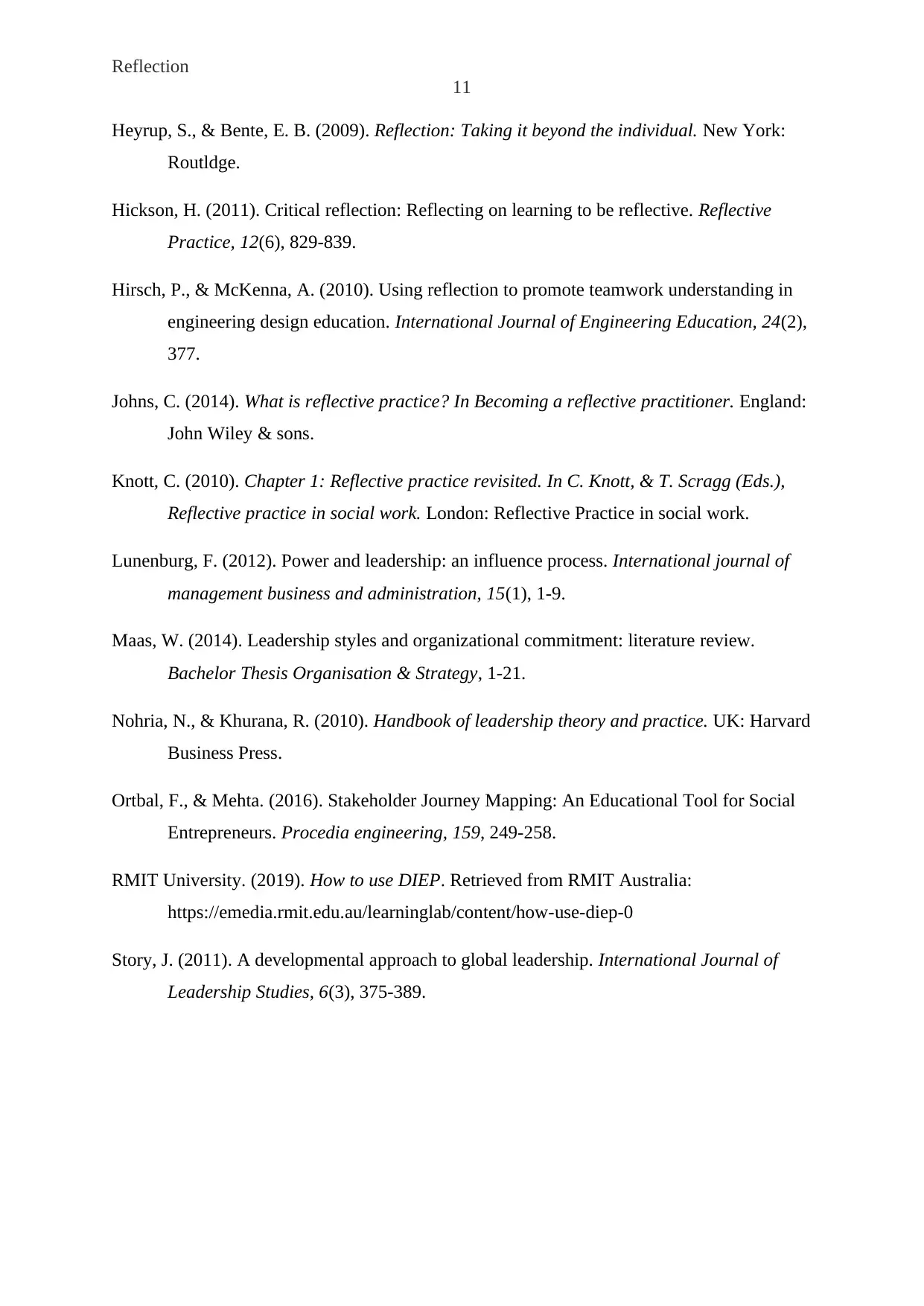
Reflection
11
Heyrup, S., & Bente, E. B. (2009). Reflection: Taking it beyond the individual. New York:
Routldge.
Hickson, H. (2011). Critical reflection: Reflecting on learning to be reflective. Reflective
Practice, 12(6), 829-839.
Hirsch, P., & McKenna, A. (2010). Using reflection to promote teamwork understanding in
engineering design education. International Journal of Engineering Education, 24(2),
377.
Johns, C. (2014). What is reflective practice? In Becoming a reflective practitioner. England:
John Wiley & sons.
Knott, C. (2010). Chapter 1: Reflective practice revisited. In C. Knott, & T. Scragg (Eds.),
Reflective practice in social work. London: Reflective Practice in social work.
Lunenburg, F. (2012). Power and leadership: an influence process. International journal of
management business and administration, 15(1), 1-9.
Maas, W. (2014). Leadership styles and organizational commitment: literature review.
Bachelor Thesis Organisation & Strategy, 1-21.
Nohria, N., & Khurana, R. (2010). Handbook of leadership theory and practice. UK: Harvard
Business Press.
Ortbal, F., & Mehta. (2016). Stakeholder Journey Mapping: An Educational Tool for Social
Entrepreneurs. Procedia engineering, 159, 249-258.
RMIT University. (2019). How to use DIEP. Retrieved from RMIT Australia:
https://emedia.rmit.edu.au/learninglab/content/how-use-diep-0
Story, J. (2011). A developmental approach to global leadership. International Journal of
Leadership Studies, 6(3), 375-389.
11
Heyrup, S., & Bente, E. B. (2009). Reflection: Taking it beyond the individual. New York:
Routldge.
Hickson, H. (2011). Critical reflection: Reflecting on learning to be reflective. Reflective
Practice, 12(6), 829-839.
Hirsch, P., & McKenna, A. (2010). Using reflection to promote teamwork understanding in
engineering design education. International Journal of Engineering Education, 24(2),
377.
Johns, C. (2014). What is reflective practice? In Becoming a reflective practitioner. England:
John Wiley & sons.
Knott, C. (2010). Chapter 1: Reflective practice revisited. In C. Knott, & T. Scragg (Eds.),
Reflective practice in social work. London: Reflective Practice in social work.
Lunenburg, F. (2012). Power and leadership: an influence process. International journal of
management business and administration, 15(1), 1-9.
Maas, W. (2014). Leadership styles and organizational commitment: literature review.
Bachelor Thesis Organisation & Strategy, 1-21.
Nohria, N., & Khurana, R. (2010). Handbook of leadership theory and practice. UK: Harvard
Business Press.
Ortbal, F., & Mehta. (2016). Stakeholder Journey Mapping: An Educational Tool for Social
Entrepreneurs. Procedia engineering, 159, 249-258.
RMIT University. (2019). How to use DIEP. Retrieved from RMIT Australia:
https://emedia.rmit.edu.au/learninglab/content/how-use-diep-0
Story, J. (2011). A developmental approach to global leadership. International Journal of
Leadership Studies, 6(3), 375-389.
⊘ This is a preview!⊘
Do you want full access?
Subscribe today to unlock all pages.

Trusted by 1+ million students worldwide
1 out of 12
Related Documents
Your All-in-One AI-Powered Toolkit for Academic Success.
+13062052269
info@desklib.com
Available 24*7 on WhatsApp / Email
![[object Object]](/_next/static/media/star-bottom.7253800d.svg)
Unlock your academic potential
Copyright © 2020–2026 A2Z Services. All Rights Reserved. Developed and managed by ZUCOL.




